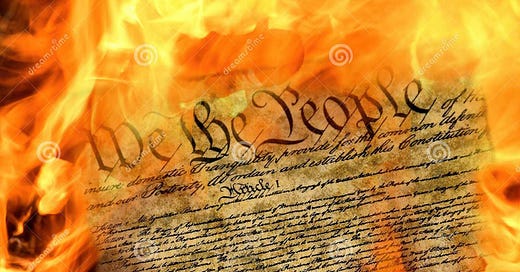Prepare for THE Constitutional Crisis with Trump
J.D. Vance’s ‘judges aren’t allowed to control’ tweet signifies Trump’s will for a dictatorship.
You knew it would come to this, didn’t you?
Last Sunday Vice President J.D. Vance tweeted on Elon Musk’s X platform, “Judges aren’t allowed to control the executive’s legitimate power.”
Translation: The President of the United States does not have to follow the rule of law. That is, the president has a right to be a dictator.
Which, of course, he doesn’t. Vance was not happy that federal judges have been temporarily barring actions based on several of Trump’s barrage of executive orders.
So…what is the president’s “legitimate power”? It is contained in three paragraphs in The Constitution of the United States:
The President shall be Commander in Chief of the Army and Navy of the United States, and of the Militia of the several States, when called into the actual Service of the United States; he may require the Opinion, in writing, of the principal Officer in each of the executive Departments, upon any Subject relating to the Duties of their respective Offices, and he shall have Power to grant Reprieves and Pardons for Offences against the United States, except in Cases of Impeachment.
He shall have Power, by and with the Advice and Consent of the Senate, to make Treaties, provided two thirds of the Senators present concur; and he shall nominate, and by and with the Advice and Consent of the Senate, shall appoint Ambassadors, other public Ministers and Consuls, Judges of the supreme Court, and all other Officers of the United States, whose Appointments are not herein otherwise provided for, and which shall be established by Law: but the Congress may by Law vest the Appointment of such inferior Officers, as they think proper, in the President alone, in the Courts of Law, or in the Heads of Departments.
The President shall have Power to fill up all Vacancies that may happen during the Recess of the Senate, by granting Commissions which shall expire at the End of their next Session.
That’s it.
The U.S. Supreme Court, through political expediency, has expanded that power, even dangerously so. In 2024 a high court majority ruled a president immune from criminal prosecution when carrying out “official acts”. As reported on PBS:
“Under our constitutional structure of separated powers, the nature of Presidential power entitles a former President to absolute immunity from criminal prosecution for actions within his conclusive and preclusive constitutional authority,” the court wrote. “And he is entitled to at least presumptive immunity from prosecution for all his official acts. There is no immunity for unofficial acts.
Of course, as you read in the Constitution’s paragraph’s above, “his conclusive and constitutional authority” does not include criminal acts.
But, reading the Supreme Court’s rationale, does that mean Trump, who has expressed unhappiness with the previous president, head of the military’s joint chiefs of staff, and other officials, could order to have them assassinated? Is that an official act? It would seem so.
Intriguingly, Vance’s weekend statement would actually negate the Supreme Court’s immunity ruling. He says judges aren’t allowed to control the executive’s legitimate power. And the legitimate power comes from the Constitution.
So it also negates the president’s power to assassinate. As you see in the Constitution’s three paragraphs, there’s nothing said that empowers the president to assassinate anyone. Not even with the advice and consent of the Senate.
Kind of adds more to the massive confusion Trump has spread in his first three weeks in office, doesn’t it.
The Coming Crisis
In an article about Vance’s power tweet, The New York Times noted:
The second Trump administration’s brazen pattern of blowing through myriad apparent legal limits has prompted debate about its intentions. One theory is that it is deliberately setting up test cases that would ultimately pave the way for the Supreme Court’s Republican-appointed supermajority to expand presidential power by striking down the statutes as unconstitutional.
But the escalating pace of courtroom clashes has raised the question of what would happen if Mr. Trump simply started ignoring decisions he did not like, rather than appealing them. The result would be a constitutional crisis.
Will Trump create such a constitutional crisis? You can bet on it. And Vance’s tweet sets the stage for it.
The call for limitless presidential power, of course, isn’t new. Dick Cheney, George W. Bush’s vice president, preached unfettered presidential authority, and also pushed for it, especially with a president’s power to declare war without Congress’s consent. But the Constitution gives only Congress the power to declare war.
Still, Cheney kept pushing for unfettered power. He seems to think he came close to succeeding. In December 2005, he was even quoted as saying, “I do think that to some extent now, we've been able to restore the legitimate authority of the presidency.”
Hmmm…There’s that word “legitimate” again.
It isn’t new. But Trump’s previous actions, including encouraging his followers’ attack on the Capitol on Jan. 6, 2021, and two previous impeachments, show he’s ready to go the limit. His current executive orders further verify that. And this time he has a vice president ready to support him.
U.S. Constitution | Constitution Annotated | Congress.gov | Library of Congress
Key facts from the Supreme Court’s immunity ruling and how it affects presidential power | PBS News
Cheney's Plain Talk on Presidential 'Authority' : NPR
Trump's Wild Tweet Drew Jan. 6 Capitol Rioters To Washington, Court Records Say : NPR
Can Donald Trump Be Impeached Again? What to Know - Newsweek
For more about Trump’s fascism and other vital issues, read my book published by Parkhurst Brothers Publishers:





Your words are like those of the weatherman who sees the tornado coming--no way to stop it.
If we happen to survive the blow, wreckage will have to stand until the fury departs.